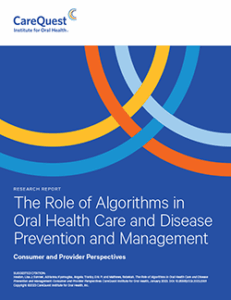Consumers and providers support the use of algorithms and digital health tools to deliver more personalized, patient-centered care, according to findings in a report by CareQuest Institute.
Using Health Data to Predict and Treat Disease
The research report shares insights from surveys of consumers and providers about their attitudes toward the use of algorithms for clinical decision-making and for health insurance companies to develop benefits. Key findings include:
- More than two-thirds of consumers said they support the use of algorithms if the tools help their oral health care provider and health insurance carrier provide them with more personalized care.
- Most consumers said they would authorize an oral health care provider to share their medical information with other medical providers. However, fewer than one in five consumers said their oral health provider had ever given them a referral to a primary medical provider.
- The majority of oral health providers agreed that algorithms and other digital tools could help them deliver higher-quality and more patient-centered care, as well as improve patients’ oral and overall health outcomes.
- The majority of providers agreed that oral health providers should screen their patients for conditions like diabetes, and that an oral health visit can be an initial point of care in chronic disease prevention and management ― especially for more than 100 million individuals who visit an oral health provider but not a physician each year.
Algorithms in health care are used to predict the likelihood that a patient will develop a specific medical condition, or whether a patient would benefit from a particular treatment. They have been used to predict tooth loss and dental caries (decay) in oral health care and systemic conditions like diabetes.
You may also be interested in:
- Integrating Diabetes Screening into Oral Health, a recorded webinar that discusses screening for diabetes in the dental setting, highlights patient education efforts, and shares the workflow providers developed to connect the most at-risk patients to medical services.
- Another Billion Reasons for a Medicare Dental Benefit, a research report that demonstrates how including periodontal treatment in Medicare has the potential to save up to $14.5 billion annually for patients with diabetes and up to $27.8 billion annually for patients with heart disease.
- Missed Connections: Providers and Consumers Want More Medical-Dental Integration, a report examining attitudes about the relationship between oral health and overall health and a desire to connect the siloed care delivery systems.

